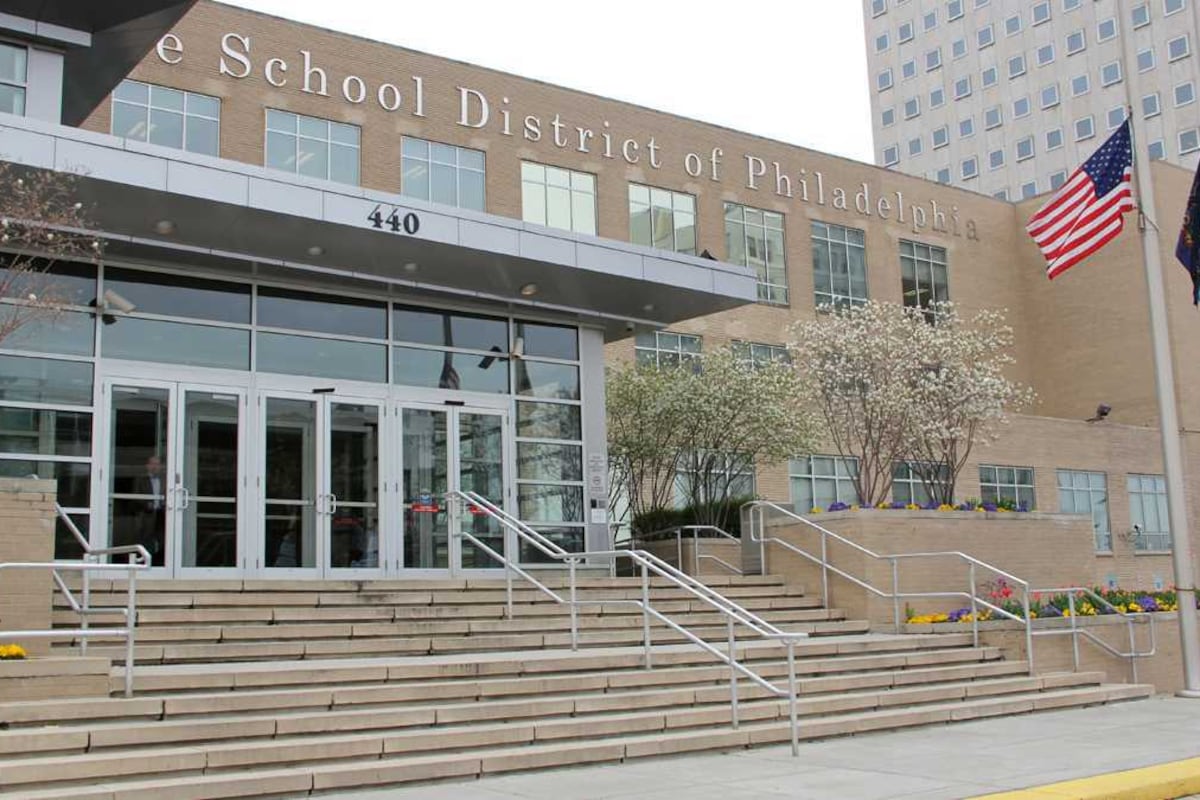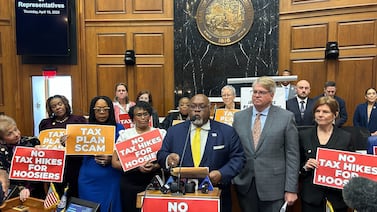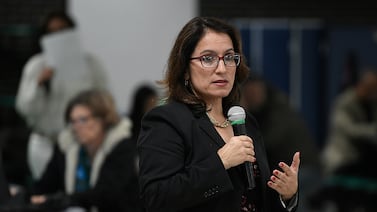At a jam-packed meeting running deep into Thursday night, Philadelphia’s Board of Education adopted the district’s budget, reviewed Superintendent Tony Watlington’s proposed strategic plan, rejected a charter school application, and more.
But while Watlington presented a hopeful vision for the district through his strategic plan, dubbed “Accelerate Philly,” the running theme of the meeting was doing more with less. Officials said without more funding and resources, it would be nearly impossible to accomplish some of their loftiest goals.
Asked by a board member if the district has the staffing to make all of the programs in his strategic plan a reality, Watlington replied: “The short answer is no.”
“We don’t have the resources and the infrastructure” to accomplish everything the district needs to do, Watlington said. He added his administration is looking at how they can “massage” the resources the district has “before we ask for more,” from the state.
Still, board member Leticia Egea-Hinton said Watlington’s five-year strategic plan “certainly fills me with not just hope, but expectation” that the district can make gains in student achievement, safety, and well-being.
Board praises strategic plan work from educators, students
Watlington presented to board members the same summary of his five-year strategic plan his office published on Wednesday. After members of the public implored the superintendent and the board to release the plan to the public before discussing and voting on it, the board delayed its vote on whether to adopt “Accelerate Philly” from Thursday’s meeting until June 1.
One of the plan’s most notable elements is its year-round school pilot; Democratic mayoral nominee Cherelle Parker supports a move to year-round schooling in some form. Other proposals in Watlington’s blueprint include:
- Replacing all security cameras at the 150 schools that have them.
- Piloting a controversial “Opengate weapons detection” system for middle schools.
- Expanding the Safe Path Program where adults are hired to monitor the streets surrounding schools to ensure students can walk home safely.
- Recruiting and retaining certified school nurses for all schools.
- Launching a “two-way communication system” to respond to parent and community member inquiries. Watlington said that many community members have complained they would reach out to the district and never hear back. Under the new two-way system, Watlington said, everyone who reaches out should expect a response.
The plan also proposes expanding the ninth grade On-Track (also referred to as Success Networks) program in an effort to boost graduation rates and reduce the number of students who drop out. According to Watlington, 3,609 students have dropped out of Philadelphia schools this academic year so far. As of October 1, 2022, total enrollment in Philadelphia public schools was 197,288, according to district data.
Board President Reginald Streater and other members largely praised the plan on Thursday and acknowledged the “sweat equity” from educators, students, administrators, and community members that went into writing the plan.
Board member Lisa Salley asked how the district will track its progress putting the plan into action. Watlington said he will create a new team within his office and will employ “external folks” to “advise a small and minimal staff” who will make sure the plan is carried out.
Watlington said he intends to give an update every January on how the district is making progress on the plan.
Board member Chau Wing Lam, speaking first in Chinese, also drew attention to the fact that there is nothing in the plan about “cultivating the diversity of the students in our system.” Lam said she would have liked to see specific attention paid to improving the district’s delivery of language offerings.
New $4.45 billion budget funds teachers, counselors
Watlington’s long-term vision got an early boost from the board’s Thursday vote to approve a $4.45 billion budget for fiscal 2024 that includes funding to:
- Hire additional counselors for the highest-need schools.
- Add 15 new safety officer positions.
- Hire more general education teachers and special education teachers.
- Purchase the new two-way communications system Watlington has touted among other costs.
Still, district officials said the money they have is not nearly enough to fund the district’s needs. Estimates from the Education Law Center and Public Interest Law Center have said “fair funding” for the city’s schools would require an additional annual funding of $1.1 billion and $318 million from the state and city, respectively.
And making progress on all of Watlington’s proposals in his strategic plan will become more difficult as the district approaches an anticipated fiscal cliff after 2024 when federal COVID relief money is scheduled to run out, Chief Financial Officer Michael Herbstman warned.
Millions in spending for new curriculum, tech, admissions
The board also voted to approve more than 70 separate items, including:
- $50 million in contracts with various vendors for new curriculum in math and language arts.
- $72 million for Apple and PC computers for all district instructional staff, school leaders, students and staff.
- $289,000 for Accenture, LLP to conduct an audit on the district’s much-maligned lottery admission process at selective schools.
- $500,000 to Teach For America to hire new teachers.
- Millions more for summer programming, special education services, and other items.
The full list of action items can be found on the board website here.
The board also voted to approve an agreement with the city to reopen West Philadelphia’s Sayre Pool, which has been at the center of a citywide debate over swimming access for Black and brown children.
Board rejects charter high school application again
Notably absent from the strategic plan presentation was any board discussion of charter schools.
As written, “Accelerate Philly” does not include any proposals, programs, or policies specific to charter schools, although some initiatives appear to be broadly inclusive of all schools under district purview.
Charter expenditures in the district are increasing at “a much greater rate” than expenditures on traditional public schools, board member Joyce Wilkerson noted.
Watlington subsequently said the “elephant in the room” is that charter enrollment is rising as traditional public school enrollment is falling.
However, the school board voted Thursday to deny Global Leadership Academy International Charter High School’s application to open a standalone high school this August. The board cited issues with curriculum and dissatisfaction with the performance of other charter schools in the city under the Global Leadership Academy (GLA) name.
This is the second time the board has denied GLA’s application to open a high school. The school revised and resubmitted its application in April.
Peng Chao, the acting director of the district’s Charter Schools Office, said despite applying to open the new school for the 2023-2024 academic year, Global Leadership Academy did not “identify a school leader or include updated information regarding staffing a brand new charter school.”
There is a “growing concern about the viability of those start dates,” Chao said.
Chao also said the two current GLA K-8 schools in Philadelphia had “mixed outcomes” when it comes to academics. The application said the proposed high school should be evaluated as a separate entity from those schools.
Carly Sitrin is the bureau chief for Chalkbeat Philadelphia. Contact Carly at csitrin@chalkbeat.org.





